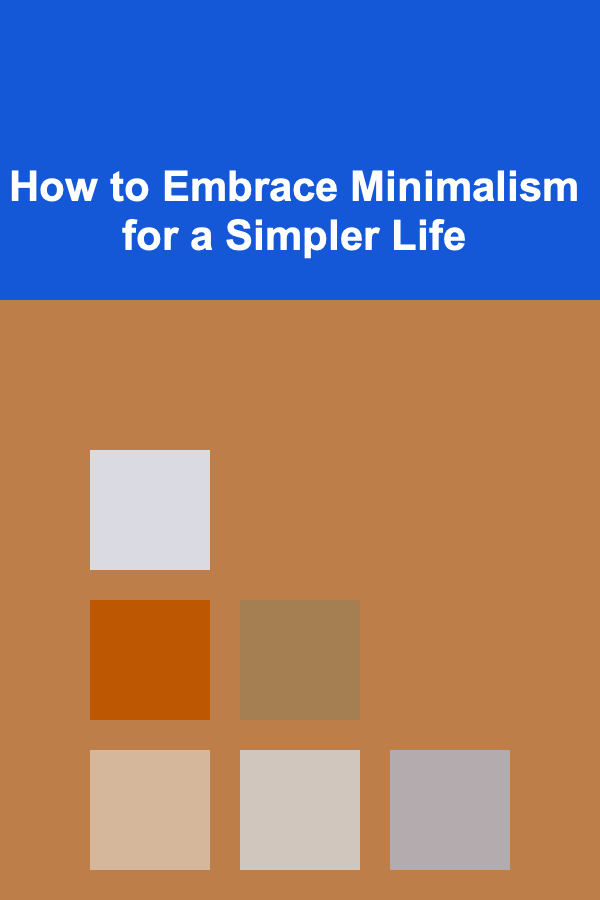
How to Embrace Minimalism for a Simpler Life
ebook include PDF & Audio bundle (Micro Guide)
$12.99$7.99
Limited Time Offer! Order within the next:

In today's fast-paced world, filled with distractions and a constant desire for more, minimalism has emerged as a powerful philosophy that encourages living with less in order to gain more freedom, clarity, and peace. But minimalism isn't just about decluttering physical possessions---it's about simplifying your life in all aspects, from your environment to your mindset, relationships, and daily routines. By embracing minimalism, you can create a simpler, more intentional life, where you focus on what truly matters to you.
This article will explore the principles of minimalism and provide actionable steps to help you embrace it in your own life. Whether you are looking to declutter your home, reduce stress, or prioritize meaningful activities, minimalism can be a transformative tool for leading a more fulfilling life.
What Is Minimalism?
Minimalism is often associated with a lifestyle that involves living with fewer material possessions. However, it is much more than just an aesthetic or a way to clear out your closet. At its core, minimalism is a philosophy---a way of thinking that challenges the cultural norm of consumerism and the constant pursuit of excess. Minimalists believe that by shedding the unnecessary, they can make room for what truly adds value to their lives.
Minimalism can take many forms, depending on one's personal values and circumstances. For some, this might mean reducing the number of physical items in their home; for others, it could involve simplifying their work life, relationships, or even their thought patterns. Ultimately, minimalism is about making intentional choices and prioritizing the things that bring joy, purpose, and fulfillment, while letting go of distractions and clutter.
The Benefits of Embracing Minimalism
Adopting a minimalist lifestyle can have a profound impact on your mental, emotional, and physical well-being. Let's explore some of the key benefits of minimalism:
2.1. More Space and Less Clutter
One of the most immediate and visible benefits of minimalism is the reduction of physical clutter. When you remove items that no longer serve a purpose or bring you joy, you create more space in your home. A clutter-free environment can help reduce stress and create a sense of calm. The less stuff you own, the less time you spend maintaining or organizing it, allowing you to focus your energy on more meaningful pursuits.
2.2. Reduced Stress and Anxiety
Our environment plays a significant role in shaping our emotional state. Living in a cluttered and disorganized space can contribute to feelings of stress and anxiety. Minimalism, by contrast, encourages a simpler, more organized environment, which can have a calming effect. Additionally, by reducing the number of commitments, tasks, and distractions in your life, you can experience greater mental clarity and emotional stability.
2.3. Improved Focus and Productivity
Minimalism promotes intentionality and focus. By stripping away the unnecessary, you can concentrate more deeply on what truly matters to you. Whether it's a personal project, your career, or your relationships, minimalism helps eliminate distractions and frees up mental space for deep work and meaningful pursuits.
2.4. More Time and Freedom
By embracing minimalism, you can free up time that would otherwise be spent maintaining possessions, managing commitments, or chasing after the next big thing. This newfound time can be redirected toward activities that align with your values, such as spending quality time with loved ones, pursuing hobbies, or working on personal growth. Minimalism offers the opportunity to live life on your own terms, without being bogged down by societal expectations or material desires.
2.5. Financial Freedom
Minimalism also extends to your financial life. By embracing a simpler lifestyle and focusing on what you truly need, you can reduce unnecessary spending and save more money. This financial freedom can lead to less stress, fewer financial worries, and the ability to invest in experiences or long-term goals that align with your values.
How to Get Started with Minimalism
Embracing minimalism is a gradual process that requires reflection, decision-making, and action. Here are some practical steps to help you get started on your minimalist journey:
3.1. Declutter Your Physical Space
The first step in embracing minimalism is often to declutter your living space. Start by evaluating the items in your home and asking yourself whether they truly add value to your life. You can use the following questions to guide your decision-making:
- Does this item serve a practical purpose?
- Does this item bring me joy or make me happy?
- Have I used this item in the last year?
If the answer to any of these questions is "no," consider donating, selling, or discarding the item. Decluttering your physical space not only helps create a more organized environment, but it also encourages mindfulness and intentionality in your choices.
Start with one area at a time, such as your wardrobe, kitchen, or living room. Once you see the positive effects of decluttering, you'll likely feel motivated to continue simplifying other areas of your home.
3.2. Simplify Your Schedule and Commitments
Minimalism isn't just about physical possessions; it also extends to how you spend your time. Many of us overcommit to activities, work, or social obligations, leaving us with little time for rest, creativity, or personal growth. To embrace minimalism, start by evaluating your schedule and identifying areas where you can simplify or let go.
- Prioritize what matters most: Focus on the activities and commitments that align with your values and contribute to your long-term goals. If something doesn't add value to your life, it might be time to say no.
- Practice time-blocking: Set aside specific blocks of time for important tasks, and avoid multitasking. This can help you stay focused and productive without feeling overwhelmed.
- Eliminate time-wasters: Identify activities or habits that consume your time without providing much value, such as excessive social media use or mindless television watching.
By simplifying your schedule, you can create more space for activities that nourish your mind, body, and soul.
3.3. Streamline Your Digital Life
In today's digital age, we are constantly bombarded with notifications, emails, and digital distractions. To embrace minimalism, take a closer look at your digital life and consider how you can simplify it.
- Organize your digital files: Clean up your computer, phone, and cloud storage by deleting or archiving files that no longer serve a purpose. Organizing your files can help reduce mental clutter and make it easier to find important documents.
- Unsubscribe from unnecessary emails: Reduce the number of emails you receive by unsubscribing from newsletters, promotions, and notifications that aren't relevant to you.
- Limit social media use: Consider setting boundaries around your social media usage. You might decide to check social media only once a day, or delete apps from your phone to reduce temptation.
By decluttering your digital space, you can reduce distractions and focus on the activities that align with your values.
3.4. Focus on Quality, Not Quantity
Minimalism encourages a shift in mindset from quantity to quality. Instead of accumulating more possessions, focus on investing in high-quality items that will serve you well over the long term. This approach not only helps reduce clutter but also fosters a more intentional relationship with the things you own.
- Buy fewer, but better: Choose items that are durable, functional, and meaningful to you. For example, invest in quality clothing that will last for years, rather than constantly buying fast fashion.
- Focus on experiences: Instead of accumulating material possessions, consider investing in experiences that enrich your life, such as travel, hobbies, or spending time with loved ones.
- Practice gratitude: Embrace a mindset of gratitude for the things you already have. This can help reduce the desire for unnecessary possessions and encourage a deeper appreciation for what truly matters.
3.5. Cultivate Mindfulness and Presence
At the heart of minimalism is the practice of mindfulness---being present and intentional in everything you do. Whether it's your work, your relationships, or your daily routines, mindfulness encourages you to slow down, focus on the task at hand, and eliminate distractions.
- Practice meditation: Meditation can help you cultivate mindfulness by training your mind to focus and stay present. Even just a few minutes a day can help you feel more centered and clear-headed.
- Embrace slow living: Slow down and savor the moments in your life. Instead of rushing through your day, take the time to appreciate the small things, like a cup of coffee, a walk in nature, or a conversation with a friend.
- Simplify your goals: Instead of juggling multiple goals and projects, focus on one or two things that truly matter to you. This can help you reduce overwhelm and increase your sense of accomplishment.
By cultivating mindfulness, you can create a life that is both simpler and more fulfilling.
Overcoming Challenges on the Minimalist Journey
Adopting minimalism is not always easy. There will be challenges along the way, especially as you begin to let go of possessions, commitments, and habits that you've become attached to. Here are some common challenges and how to overcome them:
4.1. Letting Go of Emotional Attachments
Many people find it difficult to part with possessions because they are emotionally attached to them. However, minimalism isn't about rejecting memories or sentimental items---it's about making space for what truly adds value to your life.
To overcome emotional attachments, try focusing on the memories and experiences associated with an item, rather than the item itself. If something brings you joy or serves a meaningful purpose, it's okay to keep it. But if it's just taking up space and causing stress, it may be time to let it go.
4.2. Fear of Missing Out (FOMO)
In a consumer-driven society, it's easy to feel like you're missing out if you don't constantly acquire new things or keep up with the latest trends. However, minimalism encourages you to embrace your own path and make choices based on your values, rather than societal pressures.
To overcome FOMO, focus on the things that bring you genuine fulfillment. By embracing simplicity, you'll discover that you don't need more to feel happy---you just need less.
4.3. Guilt Around Saying No
Minimalism often involves saying no to commitments, invitations, and social expectations. This can be difficult, especially if you feel guilty about disappointing others.
To overcome this, remind yourself that saying no is an act of self-care. By protecting your time and energy, you are prioritizing your well-being, which ultimately allows you to be more present and engaged when you do say yes.
Conclusion
Embracing minimalism is a powerful way to simplify your life and create more space for the things that truly matter. By decluttering your physical space, simplifying your schedule, and focusing on quality over quantity, you can reduce stress, increase productivity, and achieve a greater sense of freedom and fulfillment. Minimalism is not a one-size-fits-all solution, but rather a personal journey that invites you to live intentionally and prioritize what brings you joy and purpose. In a world that constantly demands more, minimalism offers a refreshing path toward living with less, but gaining so much more.

How to Avoid Lifestyle Inflation as Your Income Increases
Read More
How to Create a Paper Management System for Your Home
Read More
How to Create Sales Incentives That Motivate Your Team
Read More
How to Maintain Your Home's Water Filtration System for Clean Water
Read More
How to Prepare for the Financial Challenges of Parenthood
Read More
How To Deal with In-Laws and Family Dynamics
Read MoreOther Products

How to Avoid Lifestyle Inflation as Your Income Increases
Read More
How to Create a Paper Management System for Your Home
Read More
How to Create Sales Incentives That Motivate Your Team
Read More
How to Maintain Your Home's Water Filtration System for Clean Water
Read More
How to Prepare for the Financial Challenges of Parenthood
Read More